The Intel Haswell-E CPU Review: Core i7-5960X, i7-5930K and i7-5820K Tested
by Ian Cutress on August 29, 2014 12:00 PM ESTCPU Benchmarks
The dynamics of CPU Turbo modes, with both Intel and AMD, can cause concern during environments with a variable threaded workload. There is also an added issue of the motherboard remaining consistent, depending on how the motherboard manufacturer wants to add in their own boosting technologies over the ones that the CPU manufacturer would prefer they used. In order to remain consistent, we implement an OS-level unique high performance mode on all the CPUs we test which should override any motherboard manufacturer performance mode.
HandBrake v0.9.9: link
For HandBrake, we take two videos (a 2h20 640x266 DVD rip and a 10min double UHD 3840x4320 animation short) and convert them to x264 format in an MP4 container. Results are given in terms of the frames per second processed, and HandBrake uses as many threads as possible.
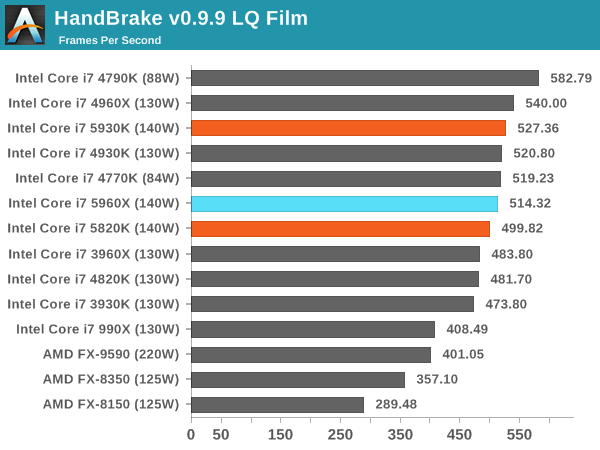
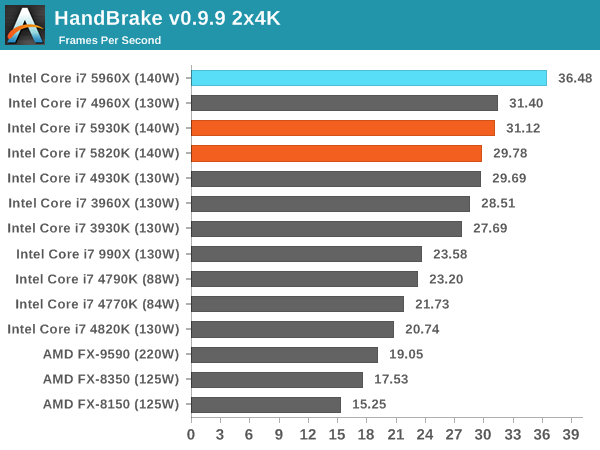
The variable turbo speeds of the CPUs results in a small difference in low quality conversion, and the high single core frequency of the 4790K wins there. For 4K conversion the problem becomes more parallel and the extra cores of the 5960X push it ahead of the pack. The 5930K and 5820K are both behind the 4960X however.
Agisoft Photoscan – 2D to 3D Image Manipulation: link
Agisoft Photoscan creates 3D models from 2D images, a process which is very computationally expensive. The algorithm is split into four distinct phases, and different phases of the model reconstruction require either fast memory, fast IPC, more cores, or even OpenCL compute devices to hand. Agisoft supplied us with a special version of the software to script the process, where we take 50 images of a stately home and convert it into a medium quality model. This benchmark typically takes around 15-20 minutes on a high end PC on the CPU alone, with GPUs reducing the time.
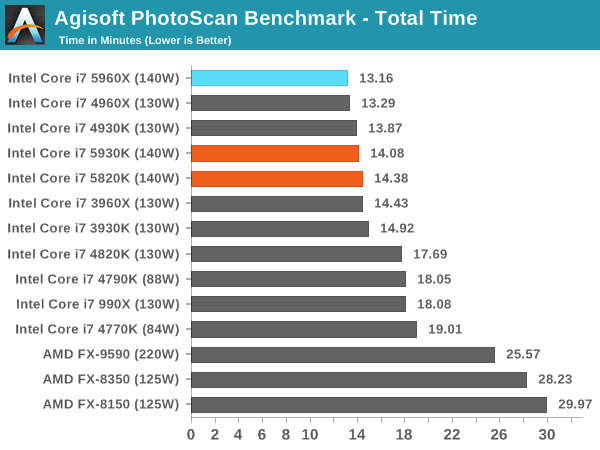
Photoscan's four separate components rely on different amounts of high frequency vs. many cores: check our Bench database for more detailed results but overall the 5960X comes out on top. That being said, the 5820K is less than 40% of the price and is only 1.2 minutes behind.
Dolphin Benchmark: link
Many emulators are often bound by single thread CPU performance, and general reports tended to suggest that Haswell provided a significant boost to emulator performance. This benchmark runs a Wii program that raytraces a complex 3D scene inside the Dolphin Wii emulator. Performance on this benchmark is a good proxy of the speed of Dolphin CPU emulation, which is an intensive single core task using most aspects of a CPU. Results are given in minutes, where the Wii itself scores 17.53 minutes.
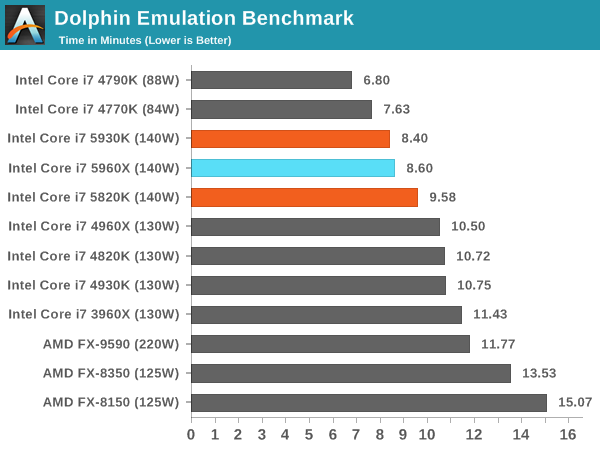
Dolphon loves single core speed and efficiency, meaning the 4790K wins out again. Interestingly the large L3 cache of the 5960X also helps here against the 5820K, despite the 5820K having a higher single thread frequency.
WinRAR 5.0.1: link
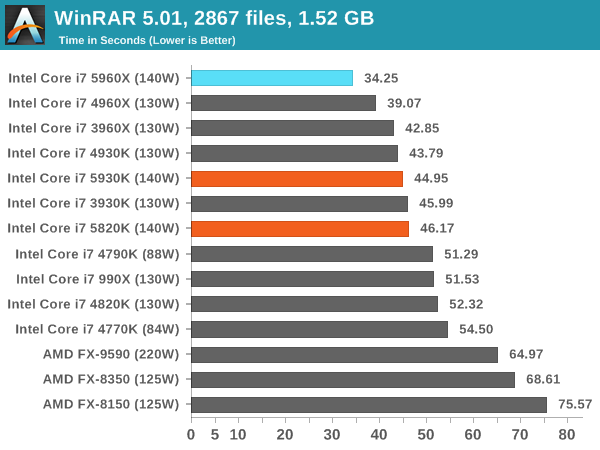
WinRAR is a variable thread workload, but more cores still wins out. Interestingly the xx60X CPUs are ahead of the xx30K CPUs followed by the xx20K. After this comes the 4790K, and then the 990X on par, showing how far three generations of Intel CPU have developed.
PCMark8 v2 OpenCL
A new addition to our CPU testing suite is PCMark8 v2, where we test the Work 2.0 and Creative 3.0 suites in OpenCL mode.
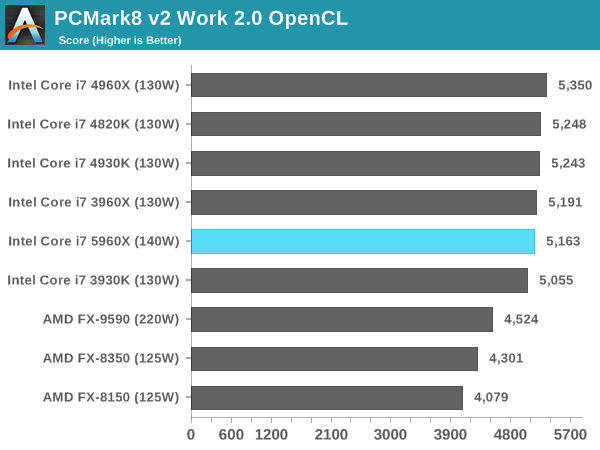
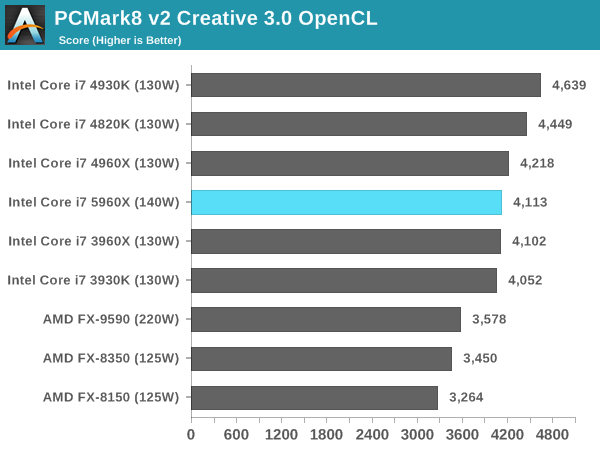
PCMark v8 relies on a number of factors, and it would seem that frequency is preferred over cache and memory. Interestingly the 4930K beat the 4960X in the Creative Suite with no obvious explanation.
Hybrid x265: link
Hybrid is a new benchmark, where we take a 4K 1500 frame video and convert it into an x265 format without audio. Results are given in frames per second.
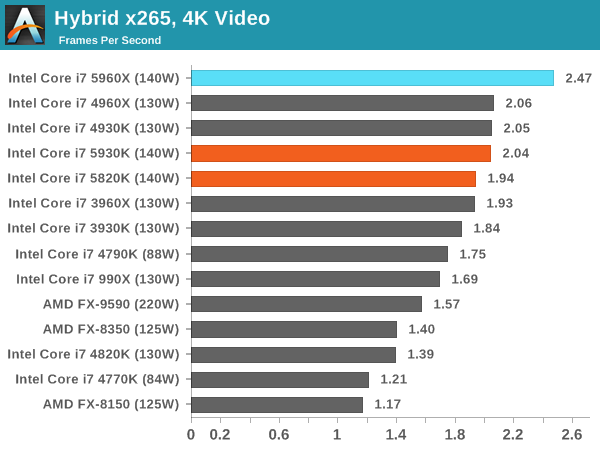
Converting 4K video gets another step in the preference for more cores in Hybrid x265. The 5820K matches the 3960X, showing the progression of CPU generational development.
Cinebench R15
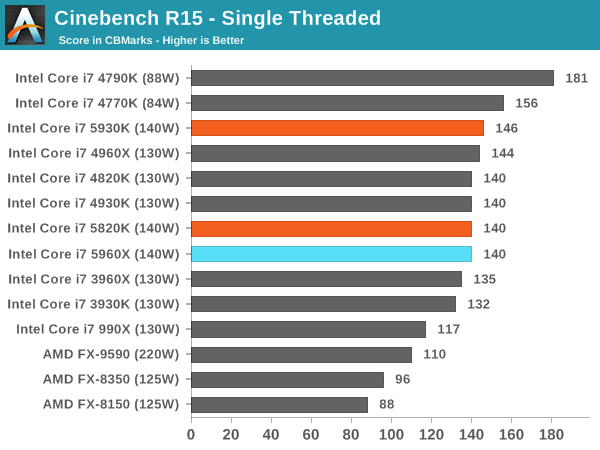
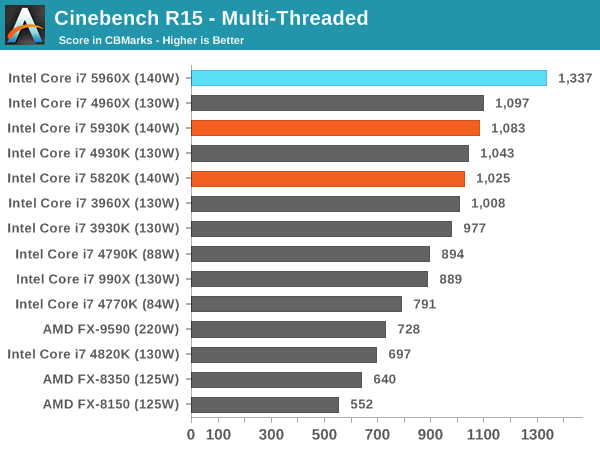
3D Particle Movement
3DPM is a self-penned benchmark, taking basic 3D movement algorithms used in Brownian Motion simulations and testing them for speed. High floating point performance, MHz and IPC wins in the single thread version, whereas the multithread version has to handle the threads and loves more cores.
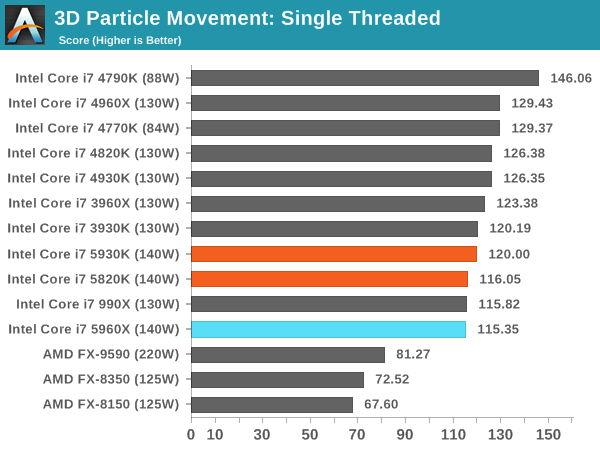
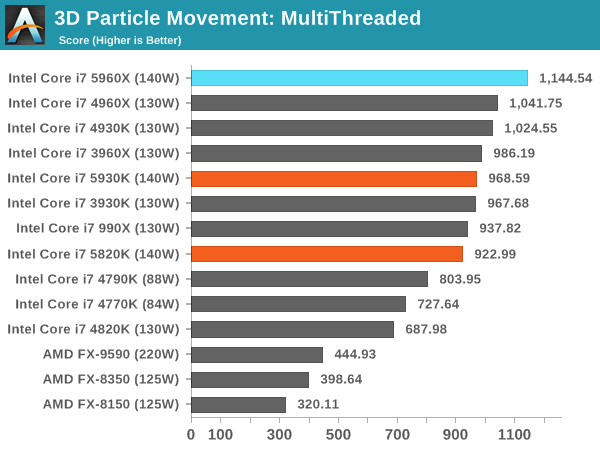
FastStone Image Viewer 4.9
FastStone is the program I use to perform quick or bulk actions on images, such as resizing, adjusting for color and cropping. In our test we take a series of 170 images in various sizes and formats and convert them all into 640x480 .gif files, maintaining the aspect ratio. FastStone does not use multithreading for this test, and results are given in seconds.
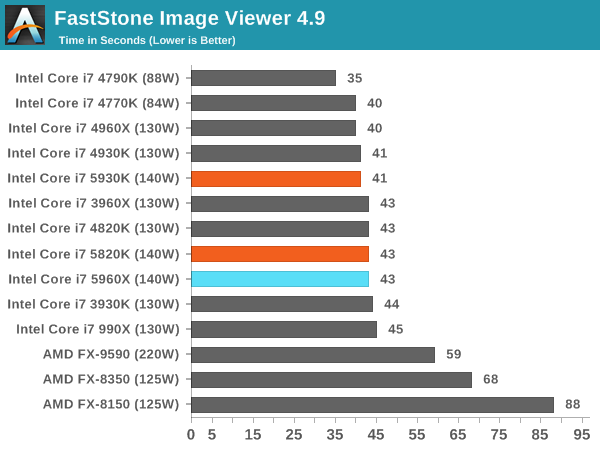
FastStone is a purely single threaded exercise, showing here how the lower core CPUs with high turbo perfom best, and by quite a margin.










203 Comments
View All Comments
mapesdhs - Saturday, August 30, 2014 - link
I agree; I'd been hoping for a midrange 8-core of some kind, but Intel's once
again shoved up the peformance/price scale purely because it can. Shame.
And IMO the PCIe provision chop with the 5820K is in the wrong direction;
by that I mean the 5820K should have 40, the 5930K have 60 and the 5960X
given 80, something like that. Supporting 4-way native x16 with enough left
over for good storage at the top-end of the CPU range would make its price
much more tolerable, but now the price difference is really just the +2 cores,
at a time when the mid-range chip ought to be an 8-core anyway (remember
the 3930K was an 8-core but with 2 cores disabled, ie. Intel could have
released a consumer 8c a long time ago).
Ian.
PS. twtech, I've benched oc'd 3930Ks quite a lot. What do you use your system for?
garadante - Friday, August 29, 2014 - link
Sheesh... Looking at these performance reviews, I'm questioning whether or not I'll even go for an -E series when I invest in a full upgrade from my 2500k in 2-3 years. In many scenarios the 4790k is at the top or near the top of the rankings due to the higher clock speeds stock/overclocked, yet the platform is much cheaper. Perhaps the 4790k equivalent 2-3 generations from now will be 6-cores, or the IPC will start going up if Intel focuses on it (I hope, but unlikely...). Otherwise these systems are just too expensive for little gain except in CPU bound workloads.l_d_allan - Friday, August 29, 2014 - link
same, with 2600kStevoLincolnite - Friday, August 29, 2014 - link
Same, I'll stick with my Core i7 3930K which happily hits 5ghz.Years ago I never would have thought a CPU released 3 years prior to the latest and greatest would still be able to compete/beat the top chips in most scenarios.
Hopefully Haswell-E's successor gives me the upgrade itch and maybe DDR4 drops in price by then, by then my platform would be 4+ years old.
Intel sure does make it hard to justify plonking down a few grand though. :(
Mithan - Friday, August 29, 2014 - link
I am waiting for skylake next year.Samus - Saturday, August 30, 2014 - link
i7-920 at 3.5GHz/X58 here (first DDR3 chipset)I was going to hold out for the first DDR4 chipset to replace this thing, but...maybe I'll wait for DDR5. Even 5 years later, my first-gen i7 is faster than like 90% of the desktop CPU's out there TODAY. Intel really outdid themselves with Nehalem.
xrror - Saturday, August 30, 2014 - link
Anyone still on 1366, I'd recommend searching around on ebay for xeon X5650 's that are getting dumped for less than $100. If your motherboard is alright with a 191BCK guess what - 4.2Ghz Gulftown with full 6(12) cores. Yeay =)DPOverLord - Sunday, August 31, 2014 - link
I upgraded from a i7 930 to a xeon 5650. Its at 4.6ghz with sli titans in surround (4800 x 2560). Based on this x99 seems to be a worthwhile upgrade albeit an expensive one. Anyone else in my boat?getho - Tuesday, September 2, 2014 - link
So is it worth upgrading an i7 @3.2 GHz to the x5650? My bottleneck is single thread performance (light room likes fast chips).xaml - Saturday, September 27, 2014 - link
I might give this a try once I stuff that Studio XPS 435 MT motherboard sporting an i7 940 into a Prodigy M. I actually had a look at compatible new processors, but they were too expensive. I am not sure if I am going to trust a used offer though.